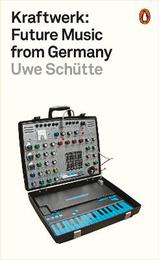
|
Kraftwerk: Future Music from Germany
Paperback / softback
Main Details
| Title |
Kraftwerk: Future Music from Germany
|
| Authors and Contributors |
By (author) Uwe Schutte
|
| Physical Properties |
| Format:Paperback / softback | | Pages:336 | | Dimensions(mm): Height 181,Width 111 |
|
| Category/Genre | Electronic
Bands, groups and musicians |
|---|
| ISBN/Barcode |
9780141986753
|
| Classifications | Dewey:782.421660922 |
|---|
| Audience | |
|---|
|
Publishing Details |
| Publisher |
Penguin Books Ltd
|
| Imprint |
Penguin Books Ltd
|
| Publication Date |
27 February 2020 |
| Publication Country |
United Kingdom
|
Description
An exploration of the astounding musical phenomenon that is Kraftwerk, and how they revolutionized our cultural landscape The story of the phenomenon that is Kraftwerk, and how they revolutionised our cultural landscape 'We are not artists nor musicians. We are workers.' Ignoring nearly all rock traditions, experimenting in near-total secrecy in their D sseldorf studio, Kraftwerk fused sound and technology, graphic design and performance, modernist Bauhaus aesthetics and Rhineland industrialisation - even human and machine - to change the course of modern music. This is the story of Kraftwerk as a cultural phenomenon, who turned electronic music into avant-garde concept art and created the soundtrack to our digital age.
Author Biography
Uwe Sch tte is a Reader in German at Aston University, Birmingham, where he teaches and researches contemporary Austrian and German literature, the writer W.G. Sebald and German popular music.
ReviewsA highly stimulating critical biography. Written from a European perspective, Kraftwerk is a pleasure to read. -- Jon Savage * New Statesman * An engaging critical introduction to the band ... you can see them everywhere: most fascinatingly in hip-hop, most obviously in techno music, but also in the chrome-helmeted anonymity of Daft Punk, in the industrial philosophy of Factory Records and the Hacienda nightclub, and, ultimately, in the general trajectory of pop music ever since Kraftwerk's run of great albums between 1974 and 1981. -- Karl Whitney * The Guardian * As the music of the 20th century fades from our ears, Kraftwerk's sound is still moving. -- Jay Elwes * The Spectator * I read Uwe Schutte's fascinating new book, and became convinced again of Kraftwerk's peculiar genius ... They remain revolutionary because they have given modern music its primitive pulse. -- Jude Rogers * Prospect * Schutte proposes that Kraftwerk was, in effect, a redemptive project, a reclamation of pre-war modernism and its aims ... This book is the German take on the German pop phenomenon. -- John Quin * The Quietus * Read Schutte's entertaining and meticulously-researched history of the band and it's hard not to conclude that Kraftwerk demand equivalence at least with the Fab Four. * The Herald * Fascinating ... Highlights just how innovative and influential they are. Kraftwerk didn't just beam themselves into the future, they invented it. -- Chris Harvey * The Scotsman * Born in Germany but based in the UK, Schutte is able to assess Kraftwerk from both the German and non-German perspective. This is a lucid, accessible, authoritative and indispensable account of the Dusseldorf group once mocked for their Teutonic 'otherness', who went on to lay the foundations for modern electronic music. -- David Stubbs, author of Future Days: Krautrock and the Building of Modern Germany Schutte positions Kraftwerk not merely as a popular music phenomenon but as the embodiment of our transition from the uncertainty and hope of post-war Europe through to 21st century techno-hyperreality. A forensic analysis of Kraftwerk's socio-political roots and their ongoing cultural effect. Schutte sees beyond the regular band trivia to show a deeper understanding of the impact of Kraftwerk on all aspects of popular culture which enclose us. -- Dr Stephen Mallinder, founding member of Cabaret Voltaire and Wrangler Schutte follows the foundational electropop group that inspired David Bowie's alienist late 1970s adventures and a multitude of electrovariations. He charts how they were a surprising European component in the emergence of hip-hop, as much through their sung-spoken words as their machine-made rhythms ... The book functions nicely as an introduction for newcomers to Kraftwerk's history. -- Paul Morley * Financial Times *
|